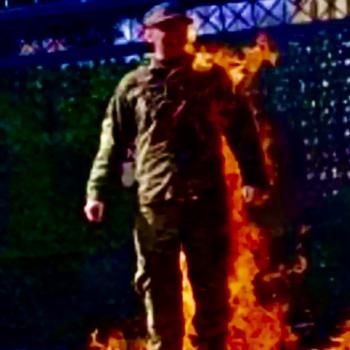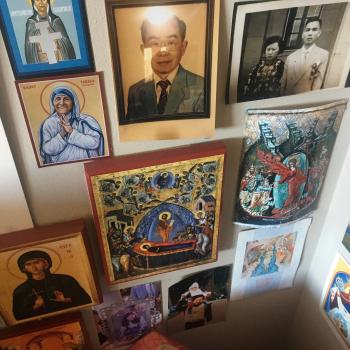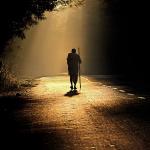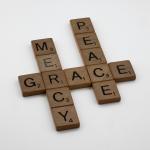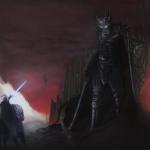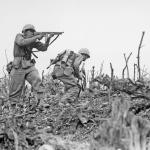![Archbishop Paul Kwong - by Father vice [The_Most_Reverend_Paul_Kwong.jpg) [CC BY 3.0 (https://creativecommons.org/licenses/by/3.0/deed.en)], via Wikimedia Commons](https://wp-media.patheos.com/blogs/sites/721/2014/07/The_Most_Reverend_Paul_Kwong-681x1024.jpg)
I suppose that ups the ante for my response.
For those who need to be caught up, OCLP is a non-violent movement that is attempting to bring deliberative democracy to Hong Kong. Tired of the Beijing central government’s repeated delays of universal suffrage for the election of the Special Administrative Region’s ‘Chief Executive,’ constitutional legal scholar Benny Tai, sociologist Chan Kin-man, and retired pastor Rev. Chu Yiuming have organized since January 2013 a series of events to have Hong Kong citizens deliberate over how they want to have elections, a constitutional guarantee in Article 45 of Hong Kong’s Basic Law. These events are known as ‘Deliberation Days,’ bringing together citizens from various aspects of civil society to put forward proposals for how candidates should be nominated and elected. These proposals were in turn put to vote recently on 22 to 29 June in an informal civil referendum. The idea is that the government — both Hong Kong’s government and the Beijing central government — should heed the voice of the people. If they do not heed the people, the idea of OCLP is to physically occupy the Central business district with acts of civil disobedience, forcing the government to hear the people. On 1 July 2014, some half million Hongkongers indeed hit the streets in protest that Beijing seems to be exerting a newfound authoritarianism over Hong Kong. Afterward, some 511 people occupied Central’s Chater Road in a rehearsal should OCLP have to happen; all were arrested, and the five organizers of the 7/1 Demonstration from the Civil Human Rights Front were detained the next day as well.
Archbishop Kwong has publicly opposed OCLP. Hong Kong’s left-leaning newspaper, Apple Daily, reports that Kwong has mocked the 7/1 Demonstrators and opposed OCLP because, simply put, it’s not what Jesus would do. The South China Morning Post attributes the change not so much to Christ, but to the fact that Kwong is currently a member of the Chinese People’s Political Consultative Conference, a gathering that advises the Chinese central government on policy issues.
As the Primate of Hong Kong Sheng Kung Hui, that is, the Anglican Province of Hong Kong, Kwong certainly has a lot of power. That I am an Anglican as well seeking to abide by the three goals of the Archbishop of Canterbury — to be involved in the renewal of the church through the renewal of prayer and praying communities, to be an agent of reconciliation, and to be a practitioner of evangelism and witness — places the onus on me to respect Archbishop Kwong as one of the 38 primates who demonstrate (albeit very imperfectly, as the Anglican realignment will readily show) the visible unity of the Anglican Communion. My comments are, as all my comments are of many of the Christian leaders with whom I have found myself in disagreement, meant to be respectful. As Justin Cantuar is teaching me, it means that ‘we must find ways to disagree agreeably.’
I hope that this does not make me a ‘river crab.’ For those who aren’t in the know, the term ‘river crab’ is a play on the word ‘harmonious society,’ an ideology propagated by the Beijing central government to form a peaceful China with minimal conflict as a space conducive to business transactions. Because this ideology tends to stifle dissent and democratic deliberation, this ‘harmonious society’ is often mocked by pro-democratic activists as anti-democratic, and the agents of collaboration are designated derogatorily as ‘river crabs.’ Although I recognize my communion with Archbishop Kwong and others who agree with him, such as his provincial secretary Rev. Peter Koon, what I have to say should position me as far from being a river crab, not least because I ultimately disagree with Kwong on the question of Occupy Central.
One has to take seriously the genre in which Kwong made his remarks. This was a confirmation homily given on a Sunday in a parish celebrating what it called ‘Theological Education Sunday.’ In this way, Kwong is doing theology, trying to educate those whom he just confirmed as to how they should live their Christian lives in the current Hong Kong situation.
Let me first, then, give a more lengthy summary of Kwong’s fuller homiletical remarks:
Kwong’s theological understanding of confirmation is that those who have given their lives to faith in Jesus Christ have in fact been chosen by God, not the other way around. For Kwong, this is a clear contrast to the recent assertions of political agency in Hong Kong, with 7/1 Demonstrators and OCLP participants demanding that they be able to choose. Such an emphasis on choice, Kwong argues, is inimical to an understanding of Christian life because, as he argues, individual, autonomous choice does not articulate the truth of our existence — which is that what we have is chosen for us by virtue of our non-individualistic existence in community. ‘See the church that we are in how beautiful it is?’ Kwong illustrates. ‘This is a gift from God above.’ Scaling out from St. Paul’s parish, he argues that the parish building is only possible because of the offerings of parish members, and those parish members are part of a church in the Province of Hong Kong, and the Province of Hong Kong is part of an 8,000,000-strong Anglican Communion around the world.
Driving the point always back to Hong Kong’s ‘chaotic’ political situation, Kwong then emphasizes that to be a ‘Christian’ is to be a follower of Jesus Christ, which means that one must consider how Jesus Christ would himself respond to Hong Kong’s political situation. He jokes that while many people ask, ‘Archbishop, how should Christians respond to this current situation?’ he feels that if he knew the answer, maybe he should be the Chief Executive! But because he does not know all the answers out of this complicated scenario, he keeps on asking that Jesus give him the wisdom to do something for this city of Hong Kong. In other words, as he says to the recently confirmed, Christians are not to think that by receiving confirmation, all problems will be solved, again contrasting this mentality with what he determines to be the simplistic theory that universal suffrage in Hong Kong will in turn solve all the food and housing shortages in the city. It’s not simple, he says, and it’s exacerbated by what he sees as the political polarization of Hong Kong, for when (as he says) he speaks one word in favour of China, he’s declared to be a river crab, but if one word critical, then he’s dipped his hand into politics.
Here, he returns to the lectionary with St. Paul’s struggle between two opposing laws of the flesh and the spirit in Romans 7. How do Christians deal with the challenges and difficulties of life? Thanks be to God, who gives us the victory in Jesus Christ. ‘How would Jesus think?’ Kwong asks. ‘If I were Jesus, what would he do?’
Turning to the Gospel, he emphasizes Jesus’ words to the disciples in Matthew 11: ‘Take my yoke and learn from me, for my yoke is easy, and my burden is light.’ ‘I do not think,’ Kwong declares, ‘that Jesus would be like certain legislators in the Legislative Council always throwing things [in reference to fellow Christian, Wong Yuk Man, a pro-democratic legislator, physically throwing bananas, papers, and a glass cup recently in chambers]. I do not think that Jesus would be like certain demonstrators on the street using all sorts of vulgarities and obscenities on the government officials. I do not think that Jesus would use this sort of irrational violence to get his way.’ Kwong then makes fun of those who keep saying to him that he must make a response and that he must protest Beijing. ‘It’s like if I don’t speak I’m mute!’ he jokes. ‘But this isn’t the way it always has to be done. Look at Jesus before Pilate, as a sheep before its shearers is silent. Sometimes you don’t have to speak, but be silent. Sometimes saying nothing is saying something.’
Here’s the controversial part, then, the part where Kwong allegedly mocks pro-democratic activists for being ‘completely brainless.’ The larger context here is this: Kwong is saying that many of the recent activism is spurred on by people who lack inner peace. As Kwong puts it, the people who hit the streets tend to live in irrational fear, like one youth who was interviewed at the 7/1 Demonstration who said that he was seizing his last chance to demonstrate because he had believed the reports that Beijing would crack down and next year there would be no democracy. ‘If that’s really the case,’ Kwong quips, ‘I would have been out there with my staff and mitre too!’ Ditto another person he talked to who opposed the New Territories’ new towns on the grounds that all of the new houses would go to mainlanders — ‘Is every single house going to the mainland?’ Kwong mocks. ‘People have to buy those houses!’ Ditto another person who thought that Hong Kong was about to lose its autonomy, or indeed, the 511 occupiers at Chater Road who indeed thought that — Kwong asks rhetorically, to loud laughter from the congregation, since when Hong Kong has in fact been totally autonomous. The ‘brainlessness’ that Kwong attributes to these people is that they are themselves living in inner turmoil, which means that their brains are wired to listen to any fear-mongering without any critical reflection. This is, Kwong suggests, unbecoming of a people called to follow Jesus, whose yoke is easy and whose burden is light.
The solution to this is to learn from Jesus’ gentleness and lowliness. Without this gentleness and lowliness, Kwong says, comes the brainlessness that he critiques in current Hong Kong politics. But with gentleness and lowliness comes the ability to discern the real situation. With this identity given to us in confirmation, Kwong argues that the response to the current Hong Kong situation is to learn from Jesus, who is gentle and lowly. This is the Christian difference, he says: we Christians are different and do things differently because Christians have a completely different identity. Practicing that kind of Christianity, Kwong concludes, is how to have inner peace.
Kwong’s theology is certainly an Anglican one. By saying that, I am counting on Kwong to be completely wrong about the ‘brainlessness’ of the public sphere. Though I have affirmed my communion with Kwong and my recognition of his theological method as akin to mine, I have not yet given any indication of my critical assessment of Kwong’s remarks. That will come later in the post, and as I indicated earlier, my assessment is severely critical.
For now, we are still trying to understand why Kwong said what he said, and I am simply trying to understand him as someone who, like me, practices Anglican theology. For that, we must turn to his recently authored doctoral dissertation, Identity in Community: Toward a Theological Agenda for the Hong Kong SAR.
Identity in Community is Kwong’s attempt to bring the work of theologian Miroslav Volf, especially in his award-winning Exclusion and Embrace, into conversation with post-handover Hong Kong politics. As those who have read Volf will remember, Volf attempts to move beyond a theology of liberation to one that frames exclusion as the cardinal sin (especially in a 1990s context of ethnic cleansing) and embrace as the Christian practice that resists exclusion. For Kwong, Volf’s theology sheds light on Hong Kong because it provides a theological framework that can make for full reconciliation with churches in China, if not China itself, in the political turmoil of developing a distinctive political identity for Hong Kong.
Outlining a view of Hong Kong’s history as a British colony that transitioned into a Special Administrative Region of the People’s Republic of China (PRC), Kwong notes that there are different ways that Christian churches have approached Hong Kong’s political sphere. There have been, he notes, collaborators with the colonial regime; there have also been pro-democracy activists. As the handover was taking place and Basic Law was being drafted, there were a number of different approaches to the PRC. There are, for example, still democratic ‘social justice’ activists, even as there are those who prefer a path of ‘disengagement.’ The one he spends the most time on, though, are what he calls the pragmatists, partly because he agrees with them and implicitly wants to suss out an Anglican theology for them. Pragmatists, Kwong argues, are those who are happy to work with the new handover government and even the central government for the common good, even if those governments are themselves imperfect.
For all the talk about Joseph Cardinal Zen’s pro-democratic activities, Kwong traces the theological framework for the pragmatic approach to a 1989 Catholic pastoral letter given by Zen’s predecessor, Jean-Baptist Cardinal Wu. Titled ‘March Into the Bright Decade,’ Wu sets out ‘reconciliation’ as the primary task of Christians in Hong Kong, especially as the PRC gets ready to take over sovereignty. Applying the Catholic principle of subsidiarity, Wu exhorts the faithful to start with reconciliation in ‘small communities’ by studying the Word of God, gathering regularly, and being pluralistic — and then scaling up from those small communities toward the parish, then to the diocese, and then to the full catholicity of churches within the PRC. As Kwong observes in his analysis, the point here applies for Anglicans as well, for both Anglicans and Catholics share catholic union with churches located within the PRC. In order to bring about reconciliation with those churches where geopolitical divisions have rendered them asunder, Kwong reads ‘March Into the Bright Decade’ as advocating a pragmatic approach with the mainland.
Herein lies my disagreement with Kwong, at least in the outworking of his pragmatic theological framework. While many would automatically conclude from this reading that Kwong was a ‘river crab’ even before joining the CPPCC, I would contend that Occupy Central can be read as an application of Identity in Communion because of deliberative democracy. To be honest, when I first saw that Kwong had opposed OCLP, I could hardly believe my ears. After reading Identity in Community, I had been certain that Kwong had provided OCLP with the theological framework with which it was running!
After all, couldn’t one say that the actions of Benny Tai, Chan Kin-man, and the Rev. Chu Yiuming in bringing together citizens for deliberation a practice of Volf’s embrace, as it resists exclusion by bringing together disagreeing citizens to come up with a common good? With the small groups that mark the ‘Deliberation Days’ that are then scaled up into proposals to be voted on by the general public, couldn’t it be said that OCLP is in fact putting the subsidiarity of ‘March Into the Bright Decade’ into practice? With the openness of deliberation, have not the events of the last year placed democratic activists as agents of reconciliation? In other words, Occupy Central works by Kwong’s own theological formulation.
In fact, one could argue that Kwong’s homily fails by Kwong’s own theological framework. While ostensibly putting forth a Christian identity shaped by communion with other Christians, the most serious flaw is Kwong’s failure to engage with fellow Christians who disagree with him, sometimes not only pretending that they do not exist, but portraying the situation as if those who are pro-democratic cannot in turn be Christian. When Kwong suggests that the ‘throwing of many objects’ in Legislative Council was performed by non-Christians who lack an understanding of a Christian identity, is he not excluding Wong Yuk Man from his baptismal identity as well as excluding Wong’s pastor, Senlok Christian Church’s Rev. Timothy Lam Kwok Cheung, from his ordination? When he finds that pro-democratic activists are individualistic and fail to live out their identity in community, what is he saying about the leadership of the Rev. Chu Yiuming, whose public work in Chai Wan by fighting bus fare and public utility hikes and advocating for an Eastern Hospital has always been ‘for the people’? When he says that it’s ‘brainless people’ with no inner peace who join these democracy movements, what is he implying about Joseph Cardinal Zen’s hunger strikes and democratic activism? Kwong may be exhorting the newly confirmed to find their identity in community. The problem is that if indeed all who disagree with Kwong are not only ‘brainless,’ but lack a ‘Christian identity,’ then this community is marked by the very exclusion that Kwong purports to resist.
The implications of these questions are serious for Kwong’s interaction with the rest of the Anglican Communion. Imagine, for example, a Desmond Tutu — then Primate of South Africa — who was silent in the face of apartheid. Imagine if anti-segregation activists in the Episcopal Church who read Martin Luther King, Jr’s ‘Letter from a Birmingham Jail’ from the altar of San Francisco’s Grace Cathedral had kept their peace. Imagine if William Temple had never written his treatise Christianity and Social Order to advocate for the working class and their right to collective bargaining and guaranteed employment in the mid-twentieth century. By calling pro-democracy activists ‘non-Christian’ by virtue of their putative individualism and ‘brainless’ fear, is Kwong disregarding his identity in communion with these Anglicans?
I can see the rebuttal a mile away, by the way: but are things as dire in Hong Kong as to invoke the legacies of King, Tutu, and Temple?
The answer is yes.
In a jab against the 511 young protesters who were arrested on Chater Road, Kwong quips about their complaint that they were denied food and timely access to toilets, ‘Why didn’t they bring along their Filipino maids to the march?’ Here, Kwong has played right into Benny Tai’s hands. In a lecture on ethnic minorities in Hong Kong, Tai makes clear that one of the very reasons why OCLP advocates for universal suffrage is because if quite literally every person in Hong Kong had a vote, the very marginalized ethnic minorities in Hong Kong, including these Filipino maids, would be given political agency. In fact, as Tai himself well knows, Basic Law’s Article 24 has been twisted in such a way as to deny temporary foreign workers and children of Chinese mothers not registered in Hong Kong their basic human right to right of abode in Hong Kong, even if they have lived in the region for seven years. The Filipino maids should indeed have come, then, precisely because universal suffrage is stop the exclusion of the least of these and embrace them as part of the theological-political community in Hong Kong. This would, after all, been the way of King, Tutu, and Temple.
This, then, gets to the deep theological point of OCLP: when the Hong Kong government and central government is found to exclude the voice of the people from its deliberations, the people will resist those exclusions by non-violent civil disobedience in order to provoke an embrace. This people, as Tai has made clear, are not only the ethnic Chinese people of Hong Kong, but the entire diverse community that composes the whole Special Administrative Region. This is why when those acts of civil disobedience happen, they will also be acts of love and peace. They are, after all, acts of reconciliation.
Given this, it is not only strange that Kwong presents himself as such a ‘river crab.’ It is absolutely bizarre that he does not lend his staff and mitre as OCLP’s front leader.





